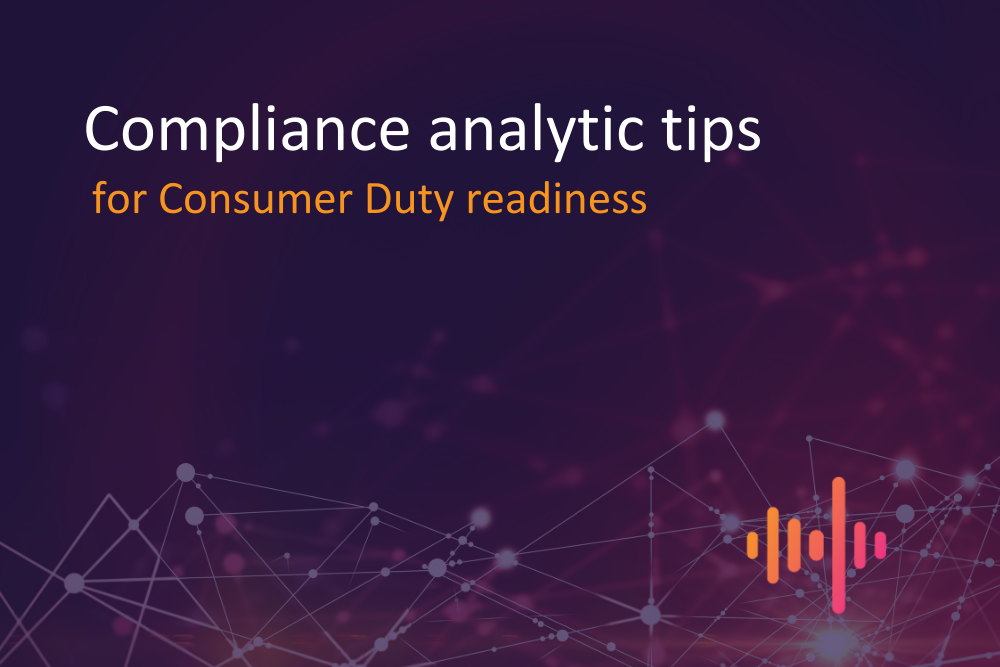1. How will the FCA assess a firm’s Consumer Duty compliance?
The Consumer Duty and how it will regulate financial service compliance is being widely discussed across the industry. The changes are significant and given that the FCA is now leading with more assertive supervision – a ‘show me and don’t tell me’ approach, and assuming that you’ve already got it covered is a risky approach
The onus will be upon proving in practice that your firm is meeting all four outcomes of the Duty and that you can demonstrate a good understanding of your target market and the needs of their customers.
With this in mind, the practicalities of how the Duty will be monitored are significantly shifting – and this change should not be underestimated. It will no longer be enough for firms to simply have a theory and policy that meets the Duty’s four outcomes and cross-cutting rules.
Being able to demonstrate Duty compliance consistently, in real terms, across all your products and service processes throughout every customer journey is going to be the key. Firms will be required to show that they have a clear understanding of their target market and what a good outcome (and equally what a bad outcome) looks like.
With so much pressure on firms to demonstrate fair customer treatment, it’s unlikely that random sampling of customer calls or interactions will be enough to achieve Duty compliance. Firms will need to go beyond a small sample and a theorised policy when it comes to evidencing that they are achieving good consumer outcomes.
2. Who is responsible for ensuring the Consumer Duty compliance at a firm?
In simple terms, the board or an equivalent governing body.
The board (or an equivalent governing body) will need to make sure that the Duty is embedded in the firm’s culture and ensure that the four Duty outcomes are consistently achieved across the business and that this is clearly evidenced and continually monitored. It will be equally important that the board ensures vigorous measures are in place to tackle and correct any underperformance.
There is an expectation on boards to have a clear set of management information that underpins the Duty’s presence throughout your business model, with the ability to demonstrate at any given time that their business is doing the right thing by its customers.
A further requirement from the FCA is to select a Consumer Duty ‘champion’ that is an independent non-executive director or equivalent. It’s the champion’s responsibility to ensure the Duty is regularly included in relevant discussions in a significant way.
Should the board not take a proactive approach to the FCA’s Duty requirements and the firm fails to comply, this change in the FCA’s style of governance could result in increased scrutiny, reputational damage and brand equity risk for your firm.
And, although the Board have ultimate responsibility for ensuring the Duty is embedded, the FCA have also strengthened the requirements around governance and accountability to ensure senior managers and executives are held accountable, and added a new Conduct Rule 6 to reflect the new, higher standard of the Duty and the behaviour they expect of all conduct staff, so responsibility for compliance with the duty and delivering good outcomes for customers cascades to all levels within an organisation.
3. What evidence does your firm need to have available for FCA’s Duty compliance spot-checks?
Firstly, FCA may check your Consumer Duty compliance at any time.
If the FCA wants to check on your firm’s Duty compliance for any reason, they could do this in several ways. They might ask to see evidence of how you’re meeting the four Duty outcomes and conduct a deep dive audit of your firm’s products, services, policies and processes to assess this. Or they may do random spot checks and request specific management information that evidences a particular customer journey.
Another scenario may be that they conduct a thematic review, for example, focused on vulnerable clients. Thus, the FCA asks firms to evidence and explain how they identify vulnerable clients and how their firms support their additional needs in practice.
So, if the FCA were to ask to see the last 50 consumer conversations your firm had, and the steps and processes taken within such calls to identify vulnerable customers – would you be able to provide the necessary evidence? Firms in this instance may need to show who was identified as vulnerable and how this was decided upon – not only that, but the regulator will also expect to see evidence that your processes can be adapted to ensure that such customers receive a ‘good outcome’ as the Duty requires.
In other instances, firms may only be asked to provide certain data to evidence an outcome, within a short, deliverable timeframe. More than ever, The FCA will be relying on data-led techniques in their monitoring, so it will be critical for firms to be able to promptly prove that they are compliant.
4. What happens if the FCA doesn’t think a firm is adhering to the Consumer Duty?
If firms are unable to provide evidence of the required level of detail, then they may not be considered Consumer Duty compliant by the FCA. This could lead to increased scrutiny including further in-depth reviews, monitoring and reporting and considerable reputational damage.
The fact that most firms have been putting customers’ well-being first for many years is an excellent starting point.
However, under the new Consumer Duty, if you can’t provide clear evidence that this is the case and demonstrate your compliance, your firm could be classed as non-compliant.
5. How can firms evidence Consumer Duty compliance?
The FCA is moving towards intelligence-led regulation with a focus on outcomes-based supervision. Under the FCA’s Consumer Duty, the regulator will increasingly be asking for data focused on consumer outcomes, and such requests could come at any time.
However, many firms are concerned about how they can sufficiently evidence Consumer Duty compliance and good consumer outcomes without drastically increasing the size of their compliance teams which carries a significant increased cost. This is where RegTech can be used, to great effect, to automate certain processes and free up staff to focus on tasks that humans do best, such as outcomes testing.
For example, Quality Assurance (QA) across the sales, service, advice and collections process can provide a hidden mine of insight to support the delivery of Consumer Duty outcomes, yet, it’s sometimes viewed as burdensome and a box-ticking exercise.
The good news is that intelligent compliance analytics tools, such as Recordsure’s Compliance Analytics AI platform, can look across and analyse the entire population of consumer conversations, allowing firms to proactively identify thematic trends and gain insights into customer journeys that can be utilised to achieve and evidence Consumer Duty compliance.
At the same time, our smart thematic classification and highly-accurate risk profiling of 100% of agent-client conversations enable targeted and rapid review of calls. Having this up-to-date information at your fingertips when FCA data requests come in will show that you take Consumer Duty compliance seriously and provides in-depth intelligence to address potential consumer harm before it occurs.





